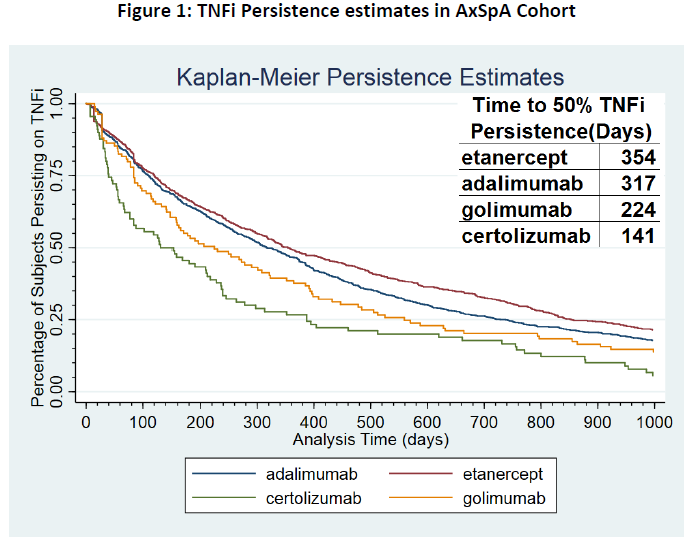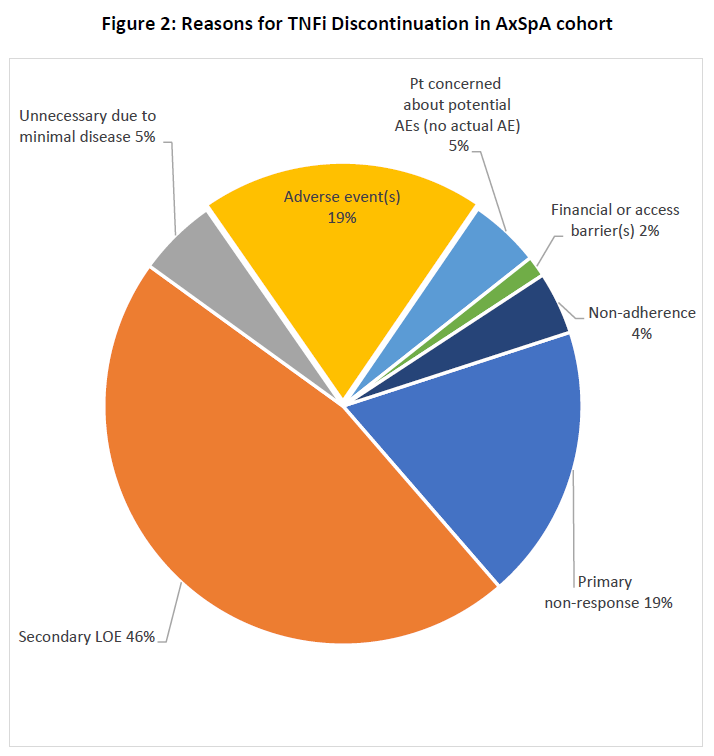Session Information
Date: Sunday, October 21, 2018
Session Type: ACR Poster Session A
Session Time: 9:00AM-11:00AM
Background/Purpose: Although tumor necrosis factor inhibitors (TNFi) have favorably altered the treatment landscape for patients with axial spondyloarthritis (AxSpA), permanent therapy is infrequent. Further, the extent to which patients continue individual TNFi agents is uncertain and the reasons for discontinuation of TNFi remain obscure.
Objective: To determine TNFi persistence and reasons for discontinuation in patients with axial spondyloarthritis
Methods: A retrospective cohort analysis was performed of US veterans enrolled from 2007 to 2017 in the Department of Veterans Affairs (VA) Program to Understand the Longterm outcomes in SpondyloArthritis Registry (PULSAR), who met ASAS criteria for AxSpA and were treated with TNFi. Enrollment sociodemographic variables, HLA-B27 status, erythrocyte sedimentation rate (ESR), and C-reactive protein (CRP) were collected. Corporate Data Warehouse Pharmacy files provided courses of injectable TNFi agents (etanercept, adalimumab, certolizumab, and golimumab). Individual TNFi persistence was first compared with unadjusted Kaplan-Meier plots, and then multivariable Cox proportional hazards regression applied, including a term for the course sequence (accounting for the order of the TNFi, [STATA]). Reasons for discontinuation (primary non-response [< 6 months TNFi exposure], secondary [>6 months TNFi exposure] loss of efficacy (LOE), adverse event, patient averseness, financial/access, minimal disease, non-adherence) were obtained by physician chart review.
Results: The cohort of 229 patients were of mean age 53.2 years, and mainly white (69%) men (93.8%). HLA-B27 was positive in 73.4%, with mean CRP of 1 [1.4] mg/dl and ESR 17.9 [17.8] mm/hr. Individual TNFi persistence was highest for etanercept (p<0.05), accounting for TNFi sequence. At approximately 3 years, persistence for any TNFi was < 25% (Figure 1). Secondary LOE was the most common reason for discontinuation, accounting for nearly half of all courses. In 20% of instances, primary non-response and adverse events accounted for TNFi discontinuation (Figure 2), while patient risk averseness, non-adherence and drug access were infrequent (<5%) reasons.
Conclusion: Etanercept has the best TNFi persistence among VA AxSpA patients, but discontinuation is common, mainly due to loss of efficacy. The contributing factors for discontinuation, including specific administration guidelines, comorbidities or anti-drug antibodies are potential areas for further inquiry

To cite this abstract in AMA style:
Bekele D, Cheng E, Geier C, Ganuthula K, Walsh J, Dubreuil M, Clegg DO, Kaushik P, Ng B, Chang E, Reimold A, Raychaudhuri SP, Duong R, Kuhn KA, Park Y, Kerr GS. Tumor Necrosis Factor Inhibitor Persistence and Reasons for Discontinuation in US Veterans with Axial Spondyloarthritis [abstract]. Arthritis Rheumatol. 2018; 70 (suppl 9). https://acrabstracts.org/abstract/tumor-necrosis-factor-inhibitor-persistence-and-reasons-for-discontinuation-in-us-veterans-with-axial-spondyloarthritis/. Accessed .« Back to 2018 ACR/ARHP Annual Meeting
ACR Meeting Abstracts - https://acrabstracts.org/abstract/tumor-necrosis-factor-inhibitor-persistence-and-reasons-for-discontinuation-in-us-veterans-with-axial-spondyloarthritis/
